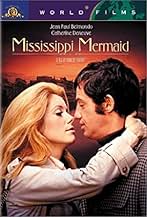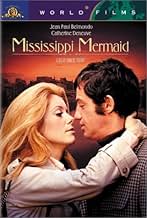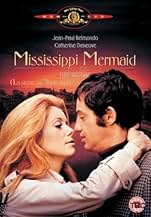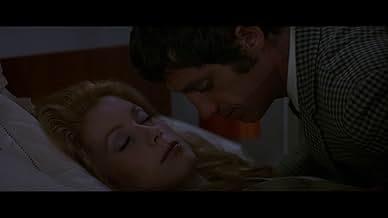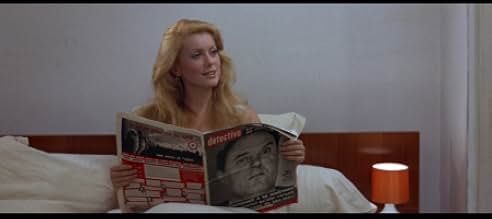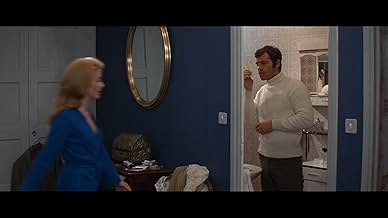El rico dueño de una plantación es cautivado por una mujer misteriosa con un pasado turbio.El rico dueño de una plantación es cautivado por una mujer misteriosa con un pasado turbio.El rico dueño de una plantación es cautivado por una mujer misteriosa con un pasado turbio.
- Dirección
- Guionistas
- Elenco
- Dirección
- Guionistas
- Todo el elenco y el equipo
- Producción, taquilla y más en IMDbPro
Opiniones destacadas
This film is a splendid drama plenty of betrayal,deception, killing, theft and Hitchcockian suspense. Good performances by Jean Paul Belmondo as young proprietary of a cigarette company who seems determined to fall under the spell of a femme fatale and a wonderful Catherine Deneuve as suspect heroine. The film gets several references to the American cinema, but Truffaut(400 blows) was a fervent moviegoer, such as : Johnny Guitar, Colorado Jim, Bogart, and Hitchcock.The USA version was cut numerous minutes and deserves an urgent restoring and remastering. Loosely based on the novel titled'Waltz into darkness' by Cornell Woolrich (Rear window and screenwriter of Alfred Hitchcock hour) who also was adapted in 'Truffaut's The bride wore black'.Colorful cinematography by Denys Clerval(Stolen kisses) and atmospheric musical score by Antoine Duhamel, Truffaut's usual musician.This is one of the best of his suspense movies along with ¨Farenheit 451 and Shoot the piano player¨. Remade by an inferior version by Michael Christofer(2001) with Antonio Banderas, Angelina Jolie and Jack Thompson, full of erotic and lust scenes.
Jean Renoir was the great humanist director. For him, all that matters is how we treat human beings. The same here for Truffaut. The film tells us that it does not matter if you're rich or poor, male or female, upholding the law or fighting it, the only thing that matters is love. This is a romantic film that has occasional touches of a good mystery/detective/noir film. The Hitchcock film that it most reminded me of was "Marnie". There, like here, it is hard to know if crime or patient love will win out in the end.
I did not care much for the New Wave style editing, which seemed out of sync with the dramatic story at times. The many shots of Belmondo driving kept reminding me of the beginning of "Breathless." The color seemed a bit dull and washed out.
The locations are lovely, but Truffaut seems to have only one thing on his mind, the relationship between the lead characters, Louis and Juli/Marion. The characters and the audience think they know each other, but the film keeps fooling them and us. We are constantly getting new information that makes us re-evaluate who they are and they are constantly surprising each other. For example, Louis has been telling Juli/Marion how much he loves her and how beautiful she is and then suddenly he gets upset and tells her how there are many of her kind - she is not really a woman or a girl, but a "chick". The term "chick" is far more demeaning here then the term "bitch" or "slut" could ever have been. He tells her that her cold attitude actually makes her ugly. Watching the scene, one thinks about how easily and naturally men can degrade women, even women they love.
The film is a bit long and occasionally meanders, but it is emotionally intense at many points along the way. It seems that nothing is happening and then suddenly there's a surprise that makes you think, "Oh my goodness, I didn't expect that." It may not be one of Truffaut's best films, but second-rate Truffaut is still better than 90% of other directors' best stuff.
"La Sirène du Mississipi" is a film-noir by the great director/writer François Truffaut, with an unconventional love story of passion, murder and love that hurts. The femme fatale Catherine Deneuve is astonishing, probably in the top of her beauty and is delightful to see her face and the topless scenes on the road and in the room. Jean-Paul Belmondo is very athletic, and the sequence when he escalates the wall of the hotel is impressive. Catherine Deneuve makes this film worth and gives credibility to the passion and lust of Louis. My vote is eight.
Title (Brazil): "A Sereia do Mississipi" ("The Mississippi Mermaid")
Louis Mahé loses more than he bargained for when striking up a distance correspondence with Julie Roussel, and then takes a rollercoaster of a ride as his relationship with her is lost then found, untied then bound, twisted and turned before thriving, and then taking several more turns. I'm not sure Jean-Paul Belmondo does anything over and above his usual, but Catherine Deneuve would snare any potential suitor, and I'm pretty sure they'd never be able to break free. A few threads left dangling, some curious editing and leaps of faith, but all in all an enjoyable film in the presence of two star performers from one of the great directors of the time.
There are a few clichés which come to mind, but "Love is Blind" is ironically the most apt, for it is the irresistible beauty of Deneuve that prevents her mail-order husband from accepting the truth. She lied before, so why not again, and again, and again? Clearly the relationship is doomed, but the illusion continues on for now, strengthened by the sacrifice already made on her behalf...
¿Sabías que…?
- TriviaQuite uniquely, director François Truffaut chose to shoot the film almost completely in chronological order. The reasoning for this was that he found the relationship between the two main characters so important, he wanted it to develop in a natural way. Truffaut actually spent the nights re-writing the scenes he would film the next day, to follow the dynamics between the leading couple.
- ErroresWhen the disc Marion has recorded is run over in the street and shattered, she kneels to retrieve the pieces; at first her right knee is uppermost, but then suddenly her left knee is higher, as she stands.
- Citas
Louis Mahé: Here we go. You're sulking. I knew it. Now you're just pretending to be mad because inside you're not really mad. You put on that cold look... but inside you're smiling. Come on. Show me your smile.
Julie Roussel: I'm fed up with all that smile crap! It doesn't work anymore! Don't speak to me. For Christ's sake, leave me alone!
Louis Mahé: All right. Okay. That's fine with me. It's not difficult to know what you're thinking of me. And you're asking yourself... "Why the hell am I with this guy who's broke... and can't even knock over an old lady in the street to steal her purse?"
Louis Mahé: [Continues, as Julie maintains an air of indifference] You only think of yourself. You're not a selfish girl. You're selfishness personified. You think that you're a real person, that you're unique. But you're not. You're just one in a growing multitude of girls now... not really bitches, not really adventuresses or whores, no... But some kind of parasite... who live outside normal society. You're not women or girls. You're "chicks". What else you are doesn't have an exact name. Mindless, with your heads full of garbage or air. You're in love with your own bodies. You're always going out in the sun, always tanning. You spend hours fixing your face. You can't pass by a car without looking at your reflection in the windshield. But you know where to find most of these girls? In airports. Yes! Everywhere planes are taking off for faraway spots. Because you are beautiful girls, and beautiful girls get fought over. They're invited from one big city to another. And they go there. They stroll around everywhere... with their little purses in hand, all made up.
Louis Mahé: [as Julie slightly glares at him] Now you're really mad. That makes me happy. Because when you're mad, your mouth gets twisted... it gets crooked. And you turn ugly. Really ugly. So dreadfully ugly.
- Versiones alternativasSPOILERS: In some versions of this film, the image of the comic strip in the newspaper that makes Belmondo's character realize his wife has been poisoning him has been removed. The probable reason is that the whole idea is a bit naive and absurd, although without this image it is impossible to explain how the man finds out that he has been poisoned. (As the comic strip in question involves Disney-related art of Snow White being offered the poisoned apple by the Witch, the removal of the cartoon in some versions is more likely due to issues involving Disney's copyright.)
Selecciones populares
Detalles
- Fecha de lanzamiento
- Países de origen
- Idioma
- También se conoce como
- Mississippi Mermaid
- Locaciones de filmación
- Productoras
- Ver más créditos de la compañía en IMDbPro
Taquilla
- Presupuesto
- FRF 8,000,000 (estimado)
- Total en EE. UU. y Canadá
- USD 33,725
- Fin de semana de estreno en EE. UU. y Canadá
- USD 11,206
- 25 abr 1999
- Total a nivel mundial
- USD 33,725
Contribuir a esta página



